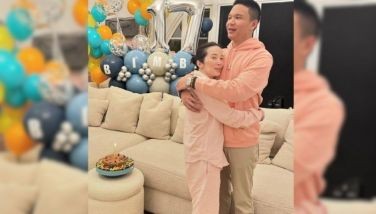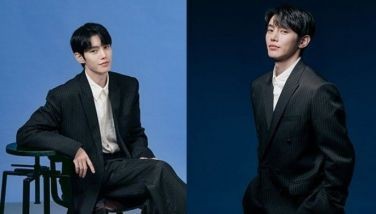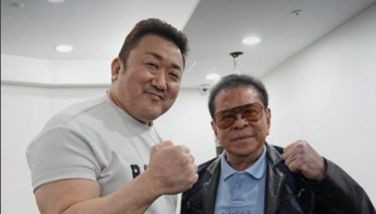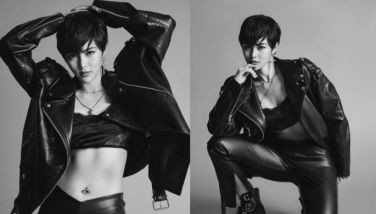Chow Yun-Fat: Hollywood and all, etcetera, etcetera
No, Chinese superstar Chow Yun-Fat doesn't end his sentences with "etcetera, etcetera....!" in 20th Century Fox's Anna and the King the way the late Yul Brynner did in the 1956 musical The King and I but how you wish Chow did! Chow doesn't sing, unlike Brynner, and how you wish, too, that he did, for you just to find out how he sounds (saying, "Etcetera, etcetera!" with a Chinese accent) and how far his singing prowess (if any) would take him.
But Chow turns in a very impressive performance as King Mongkut (with Jodie Foster playing English teacher Anna Leonowens) in this third filmization of the heart-warming story that happened a century ago.
For a bit of background on Chow, here are excerpts from the press kit distributed during the press junket for Anna and the King in L.A. in December last year:
A winner of numerous acting awards, Chow Yun-Fat has made a career of versatility, being equally at home in action thrillers, slapstick comedies and tragic dramas.
In the late 1950s, Chow spent his childhood in a fishing village on Lamma Island in Hong Kong. He moved to the city when he was 10, and at 17 quit school to work at odd jobs. At the urging of a friend, he enrolled in an actors' training course at TVB -- Hong Kong's most powerful television station. A year later, he graduated and signed with TVB as a contract player.
Chow's charisma and acting ability propelled him to leading-man status in just a few short years. In 1976, Chow starred in the 128-episode drama series Hotel, which made him a top television star and a household name in his native Hong Kong. In 1981, Chow created another craze with the series The Bund, in which he played a gangster in 1930s Shanghai. This time he became a household name in every Southeast Asian country.
Chow started making feature films in 1977 and has starred in over 70 films. His big break came in 1981 when "new wave" director Ann Hui teamed with him in The Story of Woo Viet. At that time, cheap kung-fu pictures were flooding and destroying the market. The Story of Woo Viet became a milestone in Hong Kong's cinema history because it was the first "serious" film to be both a critical and commercial success.
In 1984, Chow starred in Pochih Leong's Hong Kong 1941 for which he won Best Actor awards in the Asia Pacific Film Festival in Tokyo as well as the Golden Horse Awards in Taiwan.
In 1986 he made 12 pictures, a record for a leading actor. One of these was John Woo's A Better Tomorrow, which made cinema history: It not only broke all box-office records in Hong Kong, Taiwan, Singapore, Malaysia, Thailand, Indonesia, South Korea and Chinatowns all over the world, it also made a superstar out of Chow. It garnered him his first Best Actor Award at the Hong Kong Academy Awards, but more importantly, he created a phenomenon unseen before in Asia. Audiences everywhere cheered whenever Chow appeared on the screen. Young men began wearing the same dark glasses and long overcoats as his character did in the film. To them, Chow was a hero, and also their pal.
Other Chow hits include Wong Jing's God of Gamblers, Rain Man (and its sequel), Witch From Nepal, The Eighth Happiness, Tiger on Beat and Treasure Hunt which has been announced for a Hollywood remake starring Chow himself.
In 1993, Chow allowed his last long-term contract in the Hong Kong film industry to lapse. His last Chinese-language film to date was 1995's Peace Hotel, produced by John Woo and underwritten by the government of Mainland China.
For the American cinema, Chow starred in The Corruptor with Mark Wahlberg, and The Replacement Killers with Mira Sorvino.
Chow will next be seen in Ang Lee`s Crouching Tiger, Hidden Dragon.
Below are excerpts from the interview with Chow who's quoted almost verbatim (quaint grammar and all) to retain the flavor of the Conversation and to capture the essence of the Hollywood superstar-to-be:
It's the first time an Asian is playing King Mongkut in this another retelling of Anna Leonowens and the King of Siam.
"The people, they think the actor has the ability to carry this character, so they will pick it up and change to Asian. Otherwise, they will stick to the old, old way."
How do you feel when people say that you're leading the way (to Hollywood) for other Asian actors?
"No, no! Back to the '70s I did a lot of very popular TV series in Hong Kong. I cannot say that I'm the most advanced TV actor in my country, but I can say that all my work in the TV are popular. Now, from '80 to '90 before I moved here (to Hollywood), you can see probably all my movie from early '80 to 1993, I nominated nine times. I got four times best award in Hong Kong, thrice in Taiwan and once in the Pacific. So you can see all what I'm did in these years I almost try my best, do my best. Now I'm trying to looking new way to explore my world, to explore my career. I try my best to give all my talent to the film industry and the TV. Now I'm just trying to exhale, to breathe, to explore my world, you know."
Some critics say that you broke into Hollywood at the expense of the Hong Kong (film and TV) industry.
"I'm not a god! I cannot go back to Hong Kong and say, `I'm the god! I can save you!' I trying to explore new ways and new world, you know! Even though I make 20 movies a year in Hong Kong, maybe people don't want to see it. Unfortunately, the god die in a lonely place."
You play the King Mongkut character pretty well, a refreshing departure and quite different from the performances of Rex Harrison (1946's Anna and the King of Siam, with Irene Dunne) and Yul Brynner (1956's The King and I, with Deborah Kerr).
"You think so?" (Breaking into a wide, approving smile) "Oh, so I have to thank the director (Andy Tennant of Ever After fame) because he show me the way how to do it. More or less, I am close to the character because of my color, my skin tone, my voice. I didn't have to show or create an Asian sound because this is my native sound, you know!" (Laughing) "You can see Yul Brynner trying to create certain Asian-American sound to project the character's Asian nature; I didn't have to. Even though I can speak totally hundred percent native American English, if you couldn't believe it, you know, you have to stick to where your heart is. You know what I mean? Your voice should come from your heart; it's not from your creation."
I get what you mean.
"You're one of the best method actors if you can create your skin tone, your color, and everything is totally changed. But I don't think so. Like Rex Harrison had to create his voice in a certain way."
I get what you mean.
"You think so?"
Didn't you feel intimidated acting beside the formidable Jodie Foster?
"She made me feel very comfortable and full of confidence in front of her. But the partnership is more important than anything when performing. People can see in the movie if the two of you, you and your screen partner, are not very close and very comfortable with each other in real life. People can see it on the big screen right away."
What's Chow Fun-Fat like away from the camera?
"I'm a very boring person. Boring." (Jokingly adding) "Don't mention it!"
Oh?
"I hate shopping!"
Oh, yeah? What do you want to do when you're not working?
"Sleeping!"
You can't be boring if People magazine finds you "The Sexiest Action Star" (one of the magazine's "Sexiest Men Alive" for 1999). How do you feel about it?
(Smiling shyly) "Sexy?" (Sounding as if he couldn't believe it) "I think what's sexy are the movie characters I play, but not the real Chow Yun-Fat. I'm quite down-to-earth and very ordinary."
You're so humble.
(Still smiling) "I'm so boring!"
What do you find sexy in a movie?
"The heart. Some women you can see from their figure, they're sexy. What you find sexy depends on your age."
Which of the two other versions (Harrison version and Brynner version) did you like more?
"I love Yul Brynner version! Actually, 1956 version (Harrison) was a bit odd but still good."
Did you wish that you could sing in this movie?
"Hhhmmmmmmm!!!" (Speechless, actually!)
What's the hardest part of playing King Mongkut?
(Face lighting up) "Keep changing the costume. Not heavy but the weather was hot and humid. After one shot, change costume; another shot, change costume again!"
(The movie was shot in Malaysia in the heat of summer. The producers' request to shoot in Thailand was turned down. The movie is banned in Thailand because it's perceived to be offensive to the Royal Family. -- RFL)
You look slimmer in this movie than you did in your previous ones.
"Oh, yeah, because I lost 22 pounds. (Director) Andy told me to lose weight. Two weeks after shooting, I had to train again, martial-arts training."
How long did it take you to study the Thai language before shooting the movie?
"About three weeks. Sometimes I can understand one whole sentence, what it means. But you know the Thai language is difficult to learn; they have four to six pronunciation to mean one thing."
Referring to a previous question, how do you think your having been able to penetrate Hollywood will affect the chances of other Asian actors pursuing the same dream?
"I tell you what... During the '70s, we have Bruce Lee. Later on, we had Jackie Chan. He was the guy who got a lot of attention from the studio people. I think right now is the time for the studios to know that a lot of money can come from Asia, that Asia is a large market for Hollywood films featuring Asian actors. It's true, right?"
Right!
"Just like the African-American people... They have their Denzel Washington. Afro-American music almost dominate the music industry. It depends on your talents and your community how to do it. Asian artists and actors can also do what African-American artists and actors are doing."
Do you want to become an even bigger star in Hollywood than you (still are) in Hong Kong?
"I tell you what... I already very big in Hollywood!" (Breaking into laughter as if the joke was lost on you) "A lot of people living in Hollywood they are actors. I mean, it's not important to be a big star in Hollywood. What is important is looking for a good role."
Being basically an action star, was it hard for you to play a romantic hero (in Anna and the King) for a change?
"I really don't consider myself an action star. I act in television comedy and romantic drama in Hong Kong for 14 years, so I felt comfortable playing the drama and romance in this film."
Is Anna and the King very different from your past (action) films?
(Breaking into that shy smile again) "In my action films, I have two guns; in Anna and the King I have many concubines, not including my wife in the film. So I prefer Anna and the King."
Have you looked forward to playing King Mongkut?
"Seven years ago my agent told me that it might be possible to do another version of the story and that really excited me. So doing this film was a dream come true for me. This film is part of package deal."
With Jodie Foster as big bonus!
"Yes, yes! Jodie is one of my idols; I have always wanted to work with such a great actress and Oscar winner (The Accused and The Silence of the Lambs). I very much admire her films, especially The Silence of the Lambs."
Has stardom changed you in any way?
"In front of camera, I'm Chow Yun-Fat the actor. But when not acting, I'm just Chow Yun-Fat, like any ordinary people."
- Latest
- Trending





















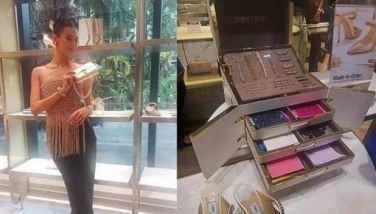

 Exclusive
Exclusive